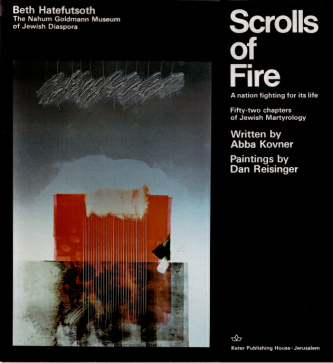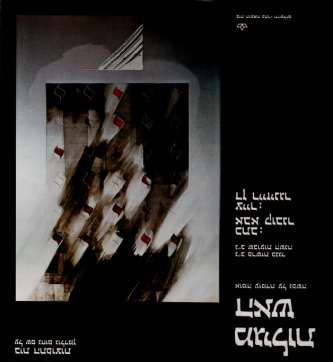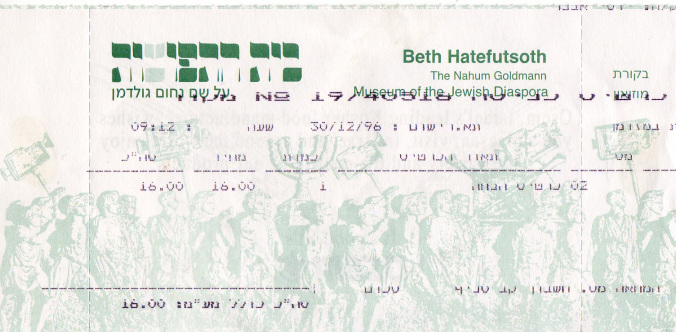Foreword about the prosecution of the Jews
by Michael Palomino
The church as main
culprit
The work describes on 52 pages 52 stations of the
international persecution of the Jews. The original book
(70 times 100 cm) is in Beth Hatefutsoth. The English
translation could be bought in Nahum Goldman Museum of the
Jewish diaspora in Tel Aviv.
The work gives a base of the dimension of the worldwide
persecution of the Jews, partly without reason, partly in
a senseless fight about "holy hills", "holy towns" and
about general allegations of a murder of "Jesus".
Church was the driving force of the antisemitism. The
church is antisemitic until now, even though the Vatican
is preaching peace again and again. The "holy bible" is a
war book until now.
Thinking on this I always have the thought that the
aggressive texts of the "holy books" should be cancelled,
that means a complete revision of all "holy scriptures"
with adaption to human rights: a pacifistic bible
revision, a pacifistic Talmud revision, a pacifistic Koran
revision.
Ticket
for Goldman Museum of Jewish Diaspora "Beth Hatefutsoth"
(1996)
Some facts are
missing
-- there is never mentioned how people of another belief
have helped the Jews
-- there is not mentioned either how different groups of
Jews have hindered each other in their development
-- according to Prof. Israel Finkelstein (director of the
archaeological institute of the university of Tel Aviv)
the first temple has not existed because there has never
been found any relict of it (recommendation: book from
Israel Finkelstein / Neil A. Silberman: The Bible
Unearthed, Munich 2002)
-- according to the Gorbachev documents the holocaust had
it's center not in Auschwitz but considerably in bunker
constructioning in the Third Reich itself after the
transportation back to the Reich.
The conjuration of a martyrdom has to be seen very
critical as well because it is provoking the fight and
peace work is missing. About Jewish life in Israel after
1946 the book is silent.
And it's a general question if a religion can be seen as a
nation. It seems this cannot be logic. Jews are a belief
community as Christians and Muslims, too.
The fotos can be seen also in big versions.
Michael Palomino (2005 / 2008)
|
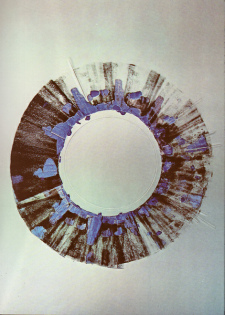
Destruction of the First Temple [according to
Prof. Finkelstein there was no First Temple]. |
1
Weeping of a Prophet:
Destruction of the First Temple, 586 B.C.E.
[According to Prof. Israel Finkelstein this temple has
never existed because not one single remnant could be
found].
All night seas of flame raged above the Temple Mount, and
Jeremiah walked with the exiles, weeping with them. Until
he left them to go back to Jerusalem, because he wanted to
console the remnant who stayed behind.
The exiles saw him leaving, and they sobbed:
"Our father, Jeremiah, what will become of us?"
Jeremiah answered and said unto them:
"I swear by heaven and earth, if you had wept one tear
while you were in Zion, you would not have been exiled!"
|
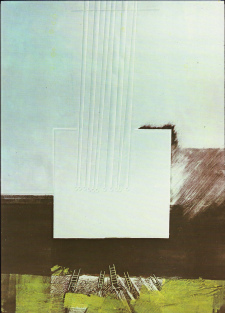
Babylonian Exile |
2
The Elegy and the Echo:
Babylonian
Exile, 597-458 B.C.E.
We were not there. But this poem followed us wherever we
went into exile:
"By the rivers of Babylon, there we sat down, yea, we
wept, when we remembered Zion."
We hanged our harps upon the willows in the midst thereof.
For there they that carried us away captive required of us
a song; and they that wasted us required of us mirth,
saying: "Sing us one of the songs of Zion."
How shall we sing the Lord's song in a strange land?
3
Brave Men Could Save Us:
The Decrees of Antiochus Epiphanes: The Revolt of
the Maccabees, 168 B.C.E.
|
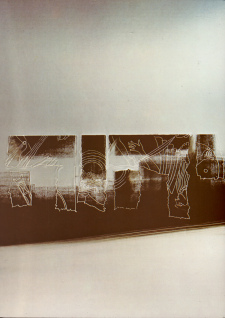
The Decrees of Antiochus Epiphanes; The Revolt of
the Maccabees |
Foreign
rule in the land of our Fathers is as cruel as the grave.
The land seemed like alien soil to us when Antiochus
decreed we must follow the laws of the gentiles, desecrate
the Sabbath and the holidays, and forsake the Torah. The
people of Israel vowed not to eat unclean food or to
desecrate the Holy Covenant, and they chose to die.
Then the King sent for Mattathias, the Priest, and
demanded that he obeys the decree.
Mattathias answered:
"Even if all the conquered people, obeying the King,
abandon the ritual of their fathers and accept the King's
decree, I and my sons and my brothers will keep to our
Covenant."
And his son Judah Maccabee rose up and was joined by all
his brothers and all the followers of his father. And they
fought the war of Israel. And they saved us. And their
memory will be blessed forever.
4
A Stiff-Necked People:
A Statue in the Temple: The Decree of Caligula, 40
C.E.
|
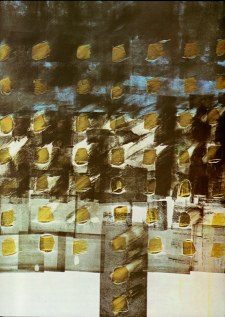
A Statue in the Temple; The Decree of Caligula 40
C.E. |
The decree of Caesar
came like thunder on a bright day, and the land trembled.
Because Caligula commanded us to accept his divinity, and
to place his statue in the Temple in Jerusalem. And we
rose, a multitude, and went up to Acre where the governor
of Syria and Israel was stationed. Thousands of us stood
in the square and said to Petronius:
"Governor! You can put the statue in the Temple only after
all our people are dead!"
And we lay there under the dome of heaven forty days and
forty nights, thousands of people. These were the days of
harvest in the land. And the governor did not dare to
carry out the decree of the King.
And when an order finally came from Rome to cancel the
edict, he left us alone, at least for a while.
|
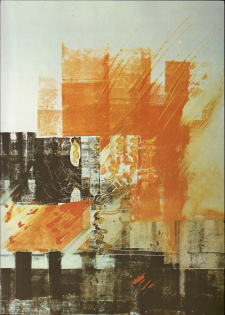
The Destruction of the Second Temple 70 [according
to Prof. Finkelstein the only one] |
5
This Night:
The Destruction of the Second Temple, 70
[According to Prof. Israel Finkelstein this was the only
Jewish temple which existed].
All night seas of flame raged above the Temple Mount. And
the soldiers of Titus went on burning all the buildings of
the Temple until the whole square was a blaze of fire.
And the upper city still stood. And when the three towers
of Herod's Palace were breached, after five months of
siege, the Romans could shout in triumph over a city
defiled in its own blood, filled with people starved to
death and slaughtered by the sword, embers and heaps of
ashes.
On the ninth of Av the First Temple was destroyed. And on
the ninth of Av the Second Temple was destroyed. And the
poet saw the dawn rising above the hearth of Jerusalem:
"Our Temple was deserted and our altar
destroyed and our Sanctuary demolished,
and our harp stopped and our song was dumb."
|
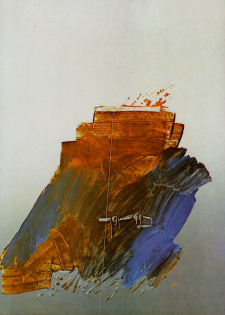
The Fall of Masada 73 |
6
The Rock and the People:
The Fall of Masada, 73
All night flames raged above Masada. And when the Roman
soldiers came storming over the ramps piled up against the
smoldering fortress, not even one of the defenders
surrendered. The Jews lay on the ground where they had
died, each man beside his wife and sons, embracing one
another in love.
And ten men, who had clearly been chosen by lot to slay
those left from each household, were also stretched out on
the earth, shoulder to shoulder, the hand of the last one
still holding a knife.
And there was no one among the besieged who lacked the
courage for this deed. And the number of the dead was nine
hundred and sixty.
And when the amazed conquerors came upon the scene, one of
the soldiers said:
"The rock and the people have become one."
|
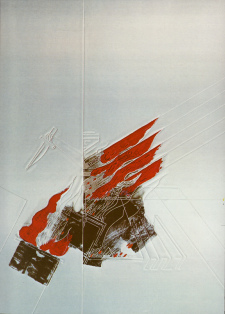
The Diaspora Rebellion 115-117 |
7
Their Blood Ran Down to the Sea:
The Diaspora Rebellion 115-117
All night seas of flame raged in Alexandria, in Cyrene,
and in Salamis because the Jews, with unbelievable daring,
at the same time and in different countries, attacked the
Greeks who persecuted them.
The Jewish rebels fought their stubborn war for two years.
They overcame the garrisons throughout Cyrenaica, Egypt,
and Cyprus, and dispersed them. Until the legions of
Emperor Trajan were summoned, and the revolt was
suppressed with terrible cruelty.
And so many Jews were slain by the sword that their blood
ran down to the sea.
|
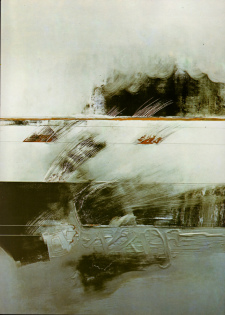
Bar Kokhba Revolt 132-135 |
8
All the Proud Sons of Your People:
Bar Kokhba Revolt, 132-135
Every night seas of flame raged over a thousand cities and
villages in Judea, the Galilee and Samaria. A leader of
the Jews had arisen, Simeon Bar Kokhba, who held up the
banner of revolt and minted coins for the freedom of
Jerusalem.
From near and far the Roman Empire rushed fourteen Legions
against small Judea. And Bar Kokhba fought them and
conquered almost fifty fortresses in the first year. He
destroyed the twenty-second Legion completely.
Three and a half years passed, and the battles grew
fiercer until the strength of the nation gave out. Betar
fell and Bar Kokhba was killed with all his men.
1800 years later a Hebrew poet said:
"Wells of strength will be in you
and streams of your people's proud sons
whose ancestors wrestled with God
and took His blessing with a strong hand."
|
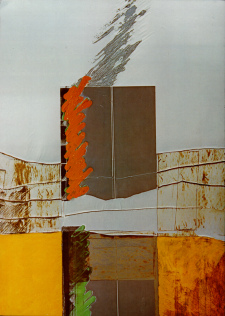
The Moment of Conversion 135
|
9
Transgress and Suffer Not Death:
The Moment of Conversion, 135
In the marketplace of Hebron, near the tamarisk of
Abraham, they sold masses of Jewish captives into slavery.
There were so many that they exchanged a Jew for a horse.
The land of Judea became a waste. The Temple Mount was
plowed under, and the nation, twice defeated in war, was
denied entrance to the city for which it had staked it
life.
And the Emperor Hadrian forbade the observance of the
commandments because he wanted to root out every custom
that distinguished Israel from the other nations.
At that time the sages gathered secretly in the attic of
the house of Nithza in Lydda, and discussed all night
whether a Jew might be allowed to break the laws under
duress so as not to be killed. Opinions differed. There
were those who said: "He should live by the commandments -
not die for them." Finally they decided: He may transgress
and not suffer death. Except in the case of idolatry,
incest, and murder.
|
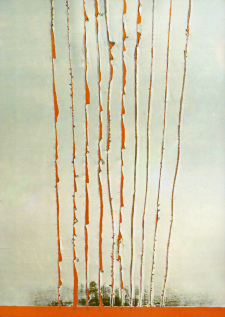
The Ten Martyrs (1) 135-138 |
10
The Ten Martyrs:
The Ten Martyrs (1), 135-138
[Martyrdom has to be seen very critical. Sometimes its
better to wait some years for a good solution without dead
persons].
When they took Rabbi Akiva and flayed his flesh with iron
combs, it was time to recite the Shema.
He raised his head and spoke out of his suffering:
"Just is the Lord Whose work is perfect."
His students trembled:
"Rabbi! How can you!"
He said to them:
"All my life I felt uneasy about that phrase 'with all thy
soul' - even if He takes away thy soul - and I said 'When
will I have the chance to use it?' Now that I do, should I
not?"
Rabbi Akiva drew out the last word of the Shema
until his soul departed.
11
And the Ones I Go On Remembering:
The Ten Martyrs (2), 135-138
|
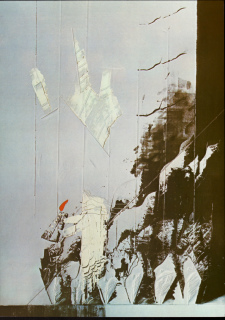
The Ten Martyrs (2) 135-138 |
After
they had executed Rabbi Judah ben Dama and Rabbi Hananiah
ben Hakhinai, they took Rabbi Yeshevav, the scribe, who
was almost ninety years old. His students wept and said:
"Rabbi, what will happen to the Torah?"
He answered them:
"My sons, the Torah will be forgotten. If only I could lay
down my life for this generation."
They said to him:
"Rabbi, what will happen to us?"
He said to them:
"Cling to each other and love peace and justice - perhaps
there is hope."
And the worst of all deaths was decreed for Rabbi Hananiah
ben Teradyon. They wrapped him in a scroll of the Torah
and surrounded him with wet twigs, so his soul could not
escape swiftly. The stiff-neckedness of the Jews amazed
their persecutors. Caesar said: Great is the lamb who
stands among seventy wolves.
|
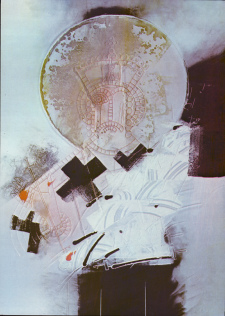
Persecutions of the Byzantines in Syria 486-507 |
12
Without Mercy:
Persecutions of the Byzantines in Syria, 486-507
When they announced to Emperor Zeno that they had burned
the main synagogue of the Jews in Antioch, and the monks
and the mob had set fire to the bones of those who were
buried next to the house of prayer, Caesar called out:
"Why did you not burn the live Jews together with the
dead?"
And Jerome, one of the founders of the Christian Church,
who had studied the Torah and Hebrew with the sages of
Lydda, sowed seeds of hatred:
"Jews," he said, "are wretched people, not deserving of
mercy."
13
A Fire Consumed Your Home:
The Destruction of Jewish Communities in Southern
Arabia, 624
|
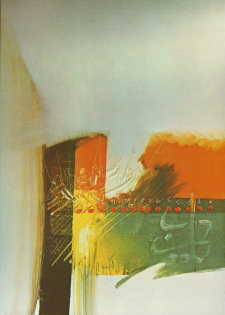
The Destruction of Jewish Communities in Southern
Arabia 624 |
And the last fortress
during the wars of Mohammed against the tribes of Israel
was Kuraitah, near Medina, a settlement where the Jews
grew palm trees. The courageous people of Kuraitah did not
have time to strengthen their fortifications before the
forces of the Moslems stormed them.
For fourteen days the Jews resisted, and when they were
defeated, Mohammed gave the order to massacre the
defenders. Mohammed stood in the square and watched as the
heads of six hundred of the elders of the community were
cut off in the marketplace of Medina in one day.
And after them, the rest of the men of the community died
for their faith; only one man saved his life by converting
to Islam.
And an anonymous woman poet, a daughter of Kuraitah, wrote
this elegy:
"Murdered by the nobles of Kuraithah,
swords of the Moslems, and spears -
a cruel disaster. Pure water
will turn bitter in our mouths. I wish I could have
ransomed my soul for this people without peer."
|
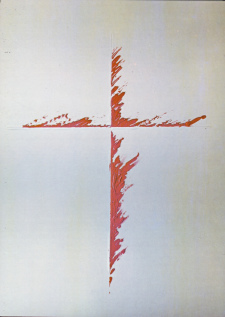
The First Crusade 1096 |
14
Slaughtered and Dragged Naked:
The First Crusade, 1096
In the one thousand and twenty-sixth year of our exile,
strangers arose, Frenchmen and Germans, severe, restless,
and bitter people, dedicated to liberate the tomb of their
Messiah in the Holy City from the Moslems. And as they
passed through the Jewish villages, they said to one
another:
"Behold, we have gone a long way and the Jews dwell among
us. Let us first take revenge upon them, let us cut them
off from being a nation, that the name of Israel may no
longer be remembered."
All night seas of flame raged in every place where the
First Crusade passed. From Rouen in Normandy all the way
to Jerusalem, they murdered the Jews. And in the
communities of the Rhine eleven hundred were sacrificed in
one day.
The year was 1096 - we hoped it would bring consolation
and relief; instead there was agony and grief.
Daughter of my nation, wrap yourself in your agony.
Don't let yourself stop, don't silence your eyes.
The son is slaughtered, the father praises God.
Whoever sees such things can only weep.
|
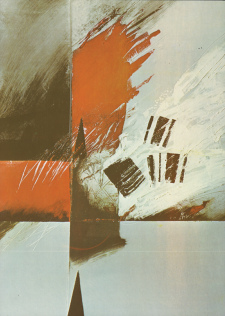
The Mainz Affair 1096
|
15
Can There Be Pain Like Mine?
The Mainz Affair 1096
At midday, Emicho, the oppressor of the Jews, came to the
gate of the city of Mainz with all his army. And when the
Jews saw the huge mob, a great army in front of them, they
clung to their Creator and prepared for battle, all of
them, adults and children. With Rabbi Kalonymos, the
Parnas at their head, they went out to fight the bearers
of the cross and the burghers.
And the enemies triumphed, capturing the city gate, though
the battle continued until midnight. At midnight the
archbishop of the town sent a messenger to Rabbi
Kalonymos, offering to save him and his entire community.
When they did not believe him, he gave them his oath.
The messenger led them across the Rhine River in boats and
then took them to the archbishop's castle.
But the next day the archbishop told them:
"I can't save you because your God has forsaken you.
Accept our faith or suffer for the sins of your
forefathers!"
Filled with bitterness, Rabbi Kalonymos brandished a knife
and threw it at the archbishop. That day the whole
community died in the Sanctification of the Name. And in
their last moments, they cried out with one voice:
"Look down from heaven and see
what we have done to keep Your Name
and our name free."
|
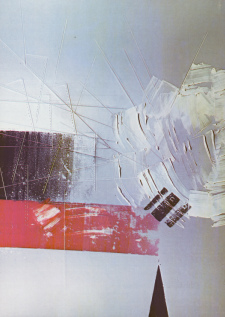
Second Crusade 1146; Blois Affair 1171
|
16
We Are Witnesses:
Second Crusade,
1146; Blois Affair, 1171
Eliezer ben Nathan, the liturgical poet, was born in
Mainz. He saw his people shattered:
"So You, God, have deserted us and left us
more than a thousand years in sorrow.
You have deprived our souls of peace,
we die for You all day like slaughtered sheep."
Rabbi Ephraim ben Jacob, the liturgical poet, was born in
Bonn. He was thirteen when he escaped with the entire
community of Cologne to the fortress of Wolkenburg, where
the Jews fought for their lives during the second Crusade.
At the age of thirty-eight he described the terrible
massacre of the Jews of Blois; and when he was almost
seventy he commemorated the people of Wuerzburg and Speyer
in a Book of Memory:
"I will write a Book of Memory
To record the pain
and evil persecutions that we suffer
God has saved us for His sake
In His mercy He will take
revenge on those who shed our blood He will make
the Temple new again in Zion."
|
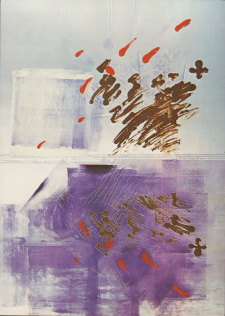
Persecutions in Germany, 1180
|
17
Mina, Gitele, Zipporah:
Persecutions in Germany, 1180
In every church love reigns - where does hatred come from?
The rabble caught Gitele from Aschaffenburg first. And
when she refused to be baptized in the cursed waters, they
took her to the river and drowned her. Then they caught
Mina from Speyer, as she was leaving town, and demanded
that she deny the living God. When she refused, they
chopped off her ears and her toes.
And there was a woman named Zipporah who, late in life,
gave birth to a son named Isaac. When enemies surrounded
her house, and she saw a knife in her husband's hand, she
cried out:
"My lord, do not raise your hand against the boy,
slaughter me first, let me not look upon the death of the
child!"
Then the lawless mob struck them with axes, and Zipporah
died screaming. Can You restrain Yourself in the face of
such things, oh God?
18
Oh Your Brother's Blood Cries From the Maghreb:
Decrees of Conversion in Islamic Lands, 1146
|
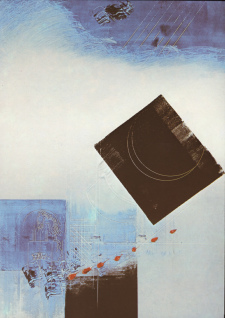
Decrees of Conversion in Islamic Lands, 1146
|
When the Almohades
conquered Sijilmassa in Morocco, they gathered the Jews of
the city and demanded that they convert to Islam. They
negotiated with them for seven months, and during all that
time the Jews fasted and prayed.
Afterwards the commanders returned, and the Jews refused
to obey them. Then one hundred and fifty of the finest in
the community of Sijilmassa, affirming the Oneness of God,
were cruelly killed.
As to the news of what happened in the remaining
communities of the Barbary States - whoever hears it, his
ears will tingle.
There followed years of emergency, decrees and conversions
in Jewish communities throughout Africa, and thus the
words of the prophet were realized:
"Such as are for death, to death, and such as are for the
sword, to the sword; and such as are for the famine, to
the famine; and such as are for the captivity, to the
captivity."
"Oh I will lament:
The community of Sijilmassa,
city of sages and scholars,
Marrakesh the exalted,
her finest murdered,
the whole congregation of Fez
banished from sight,
Oh I
will lament:
Sebta and Meknes,
darkness covered their light,
Tlemcen and Dra,
struck by the sword,
Tunis and Sousse
the holy praying to the Lord,
Oh:
Sons of Gabes and Tripoli,
pouring blood in streams,
The heavens did not hear
Their cries, their screams.
Mine
eye, mine eye runneth down with water."
19
My Ancestors Were in York:
The Third Crusade, Pogroms of the Jews in England 1190
|
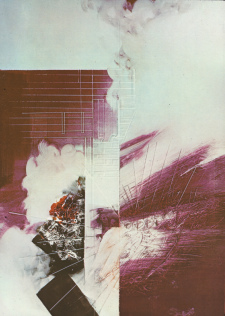
The Third Crusade, Pogroms of the Jews in England,
1190 |
... And these things
must be handed down to each generation. How a great and
good country became a field of slaughter:
On February 6th, the Jews were massacred in Norwich.
On March 6th, in Stamford.
On the 18th, in Bury St. Edmunds, Lincoln, and Lynn.
And on the day of the King's coronation,
the Jews of London were sacrificed.
Crowds in England hurried to join those aroused by the
Crusade and, before they reached Jerusalem, demonstrated
their valour on the Jews. Many English noblemen felt some
compassion at the terrible massacre, but did nothing to
prevent the bloodshed.
Josce, a leader of York, managed to bring his people
inside the walls of the castle, where they were besieged
by their enemies for three days and three nights. When
they saw there was no one to save them, five hundred of
the persecuted decided to die for the Sanctification of
God's name.
In the Castle of York You are with us now and forever.
We bound the Sabbath and our bodies together
with threads of linen.
And with a seven-branched menorah we shed light
upon the Oneness of Your Name and our last night.
20
The Covenant of the Doves:
Sanctification of the Name by Whole Communities during
the Period of the Crusades
|
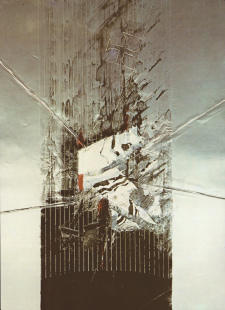
Sanctification of the Name by Whole Communities
during the Period of the Crusades. |
Why has Israel been compared to a dove?
As the dove does not struggle when it is slaughtered,
so Israel does not struggle when it is slaughtered
in the Sanctification of the Name.
[This is only partly right: A dove flies away when danger
is coming].
Here is the order for the Sanctification of the Name which
Jews decided should be practised by every Jewish man:
When they want to torture you and question you and make
demands of you, this will be your answer:
What do you ask of me? I am a Jew. I will be a Jew. And I
will die as a Jew.
A Jew.
A Jew.
A Jew.
Here I am ready and willing to offer myself and my flesh
and my veins and my blood to all the cruel and bitter
tortures for the sake of Your Oneness.
And for the sake of Your people Israel.
21
The Calendar:
13th Century Pogroms preceding the Black Plague
|
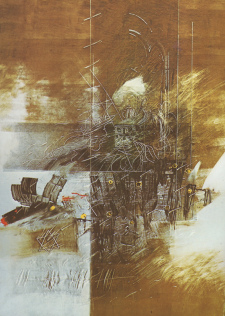
13th Century Pogroms preceding the Black Plague |
[For the medicine of that time there was
no explanation of the black plague and the Jews were the
scapegoat while Jews also have been killed by the plague.
In this context the Jews were also blamed to have poisoned
wells and other things. But the black plague had been
brought from Asia to Europe by the rats on the Italian
crusade ships which were in horrible conditions...]
Is there any pain like our pain?
Is there any calendar like ours?
Sivan - The murdered of Frankfurt, in the first year of
the sixth millenium, 1241.
Av - The murdered of Kitzingen, 1243.
Tishri - The murdered of Ortenburg, in the state of
Bavaria.
Tammuz - The murdered of Pforzheim, neighboring Speyer.
Nissan - The murdered of Koblenz, 1256.
Iyar - Seventy burned men of Sinzig, in the region of
Koblenz.
Av - The murdered of Arnstadt, in the state of Thueringen
[Thuringia].
Nissan - The burned men of Mellrichstadt, in the state of
Franconia.
Passover - The murdered of Mainz on the seventh day of
Passover and in Cracow on the same day, 1283.
Nissan - The murdered of Rockenhausen.
Heshvan - The burned of Munich, 1285.
Tammuz - The murdered of Weissenburg, in Alsace. The
murdered of Trerbach, the murdered of Lechnich and Kirn.
The murdered of Kemeno, next to Duesseldorf. The murdered
of Bonn.
Av - The murdered of Muenster.
Elul - The murdered of Siegburg.
Tishri - The murdered of Logostein.
Adar - The murdered of Bernkastel by the Moselle River.
The murdered of Altenhar in the district of Cologne.
For the sake of these holy people we shall be granted
salvation and comfort, and He will gather our outcasts
with upraised hands.
22
A Song of Degrees:
Destruction of 140 Communities in the time of the
tyrant Rindfleisch 1298
|
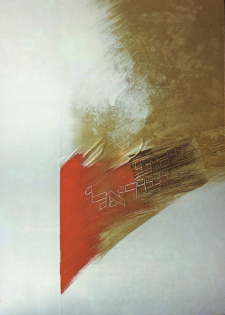
Destruction of 140 Communities in the time of the
tyrant Rindfleisch, 1298 |
Ninety souls wailed and sighed
in bitterness, "We're pure," they cried.
"Why do you shed our blood? Take all
the tings we own, but not our souls."
One wretch said, "Your only chance
to go on living is to be
like us, accept our faith. If not,
then we decree that you must die."
The tortured chosen people gave
their answer: "Let a chair of honor
carry us to heaven. God will hide
us in the shadow of his hand."
A scoundrel watched and anger leaped
in him until he set a fire
around the capital, and heaped
the wood to make the flames go higher.
Bones shuddered while the priests rejoiced
to see the smoke that curled around
the Jews as men and women turned
into a burning sacrifice.
Ninety souls were on the altar,
voices rising in the fire
with a blessing, "Hear O Israel!"
high above the flames, and higher.
23
And the Land of Your Enemies Will Destroy You:
The First Expulsion from France, 1306
|
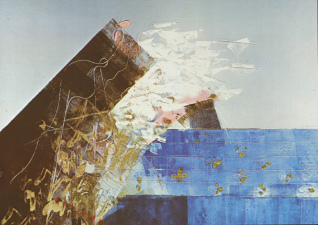
The First Expulsion from France, 1306 |
And King Philipp the Fair banished all
the Jews from his kingdom. And he took whatever they had,
their money and gold, chattels and land. Those communities
were great in wisdom and in number; they had exalted the
Torah. Now they were banished, naked and stripped of all
their possessions.
"They took me from school, tore off my shirt,
dressed me in garments of exile.
In the midst of my studies they turned me out
of my father's house and my homeland.
A young boy, and cheated,
from gentile to gentile,
from kingdom to nation I passed,
not knowing the language, outcast.
If You are a Father, where is Your love?
If You are a Master, where is Your pride?
How can You witness the loss of Your faithful?
God! Where can I turn to, where can I hide?
|
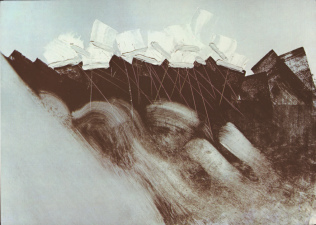
The Black Plague, 1348
|
24
Mainz - A Noble Heritage:
The Black Plague, 1348
And the Jews came together to fight for their lives. When
they saw that they could not depend on the grace of
nations, three hundred young men rose up and collected
weapons of war. The entire congregation of Mainz was with
them. And they fought against their enemies and felled
almost two hundred of them.
For five days the besieged held off the lawless army. And
when they saw the land collapsing under their feet, they
set fire to their houses.
The evil reached the communities of Oppenheim, Frankfurt,
Erfurt and Cologne, and the Jews behaved like their
brothers in Mainz. In Worms twelve leaders were the first
to fight and the first to die. They are buried in a common
grave which is still to be found in the cemetery of Worms.
And recalling this event, we say in the Penitential
Prayers (Selihot):
"When you behold
The robbing of the poor, the cries of the needy,
The murders at sword-point by the evil and greedy -
Can You restrain Yourself Oh God?"
|
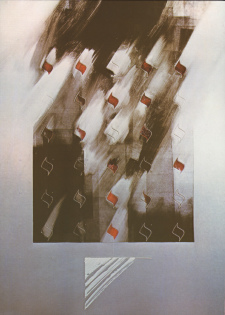
Years of the Black Plague, 1348-1352 |
25
The Vale of Tears:
Years of the Black Plague, 1348-1352
"I cry unto my God
who answers to my need,
to You alone I plead.
Be my help against the ones
who throw me to the ground.
They set themselves
against me all around.
How great my foes, how many those
who beat me down, who rob me!
How many rise against me!
How many fall upon me!"
"My son, do not say that ignorant mobs have done it. That
it was only a people caught up in madness who heaped tens
of thousands of Jews, old men and babies, men and women,
on bonfires in three hundred cities in Europe. Or that
people driven by terror were seeking a scapegoat. Jews
also were terrified and died from the dreadful plague."
A black hatred of Israel preceded the plague. Ardent
preachers encouraged it. Bells of churches called for
blood after prayers. The mobs formed themselves into
regiments. And over them were various leaders and rulers
who looked the other way. Some of them even helped.
|
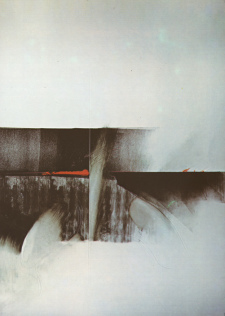
Riots throughout Spain, 1391
|
26
The Day All My Neighbors Attacked Me...
Riots throughout Spain, 1391
"Children of my people, weep with me among the ashes and
embers. For seventy holy communities in Castile and
thirty-six in Aragon, for tens of thousands of our brother
executed during the Spanish exile in the year 1391.
We got up one morning and the crowned community of Seville
did not exist; there was no trace of the splendid
community of Majorca.
Because the Jews of Spain were destroyed by the gentiles:
priests and nobles, the fiest leaders of the town and its
inhabitants, the villagers, the mob, the foreign sailors -
on that day all my neighbors attacked me.
Our daughters were raped. The murdered were dragged by
their legs. They were hanged on trees and abandoned.
I saw our brothers who fought for their lives and were
killed in the Sanctification of the Name. I saw the
Marranos , Jews who converted. I saw those who escaped to
Africa with nothing.
I was a small child and I fled to Barcelona, but the evil
reached there.
God did not answer our cry. And there is no one to answer,
no one to care.
Creator of the world, where are your wonders,
your zeal and your strength?
To whom have you abandoned your flock
in this vast desert?"
27
I Would Be Amazed by Daylight:
The burning of Jews in German cities, pogroms in
Poland, blood libel in Trent, 15th Century
|
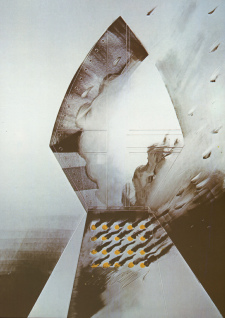
The burning of the Jews in German cities, pogroms
in Poland, blood libel in Trent, 15th Century |
I am the man who saw the tyrant John Capistrano, a small, miserable looking
creature, who set fire to innumerable souls. He was an
emissary of the Pope and the monks, and the mob followed
him, inventing blood libels in Silesia and all the German
states.
Forty-one were burned in the city of Breslau;
thirty-six in the market-place of Berlin;
a whole community was burned in Liegnitz.
And all because of the libel of the desecration of the
host. Only the community of Fuerth summoned enough courage
to stand up to him, and they drove his forces out of the
city.
There was a libel against the Jews of Trent who were
accused of killing a Christian boy in order to bake
Passover matzot from his blood. The Jews were cruelly
tortured to death, and the supposed victim was made into a
saint. At that time the light of the Renaissance shone in
the land of Italy. I would be astonished by daylight
shining for all. For you and for me, it grows dark!
|
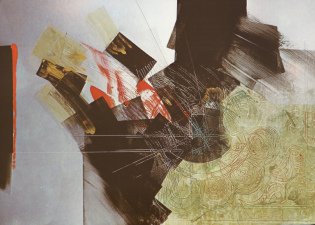
The Expulsion from Spain 1492
|
28
Land! Do Not Hide My Blood!
The Expulsion from Spain, 1492
At the beginning of the month of Adar, 1492, the days of
joy and splendor were over. There was great fear in our
houses because the decree of expulsion had been written
and signed.
And when the order was issued by the King and Queen, our
people came from all sides and assembled at the gates of
the Palace. They cried out and pleaded, but there was no
voice, no one to answer, no one to hear.
The words of the great and powerful Jewish leaders, Don Isaac Abarbanel and Don
Abraham Senor, were of no help. The decree was truth
and reason was a lie.
On the seventh of Av, close to the date of the fall of the
two Temples, the last Jews left Spain - 250,000 of them.
About 50,000 of them went to North Africa, almost 150,000
went to Portugal, a few went to Italy and Avignon. Many
wandered as far as the Ottoman Empire.
They say that thousands sailed to the ends of the earth,
and there is no way of knowing how many of them drowned in
the depths of the sea. Our homes and our property in Spain
were given to the monasteries. All our cemeteries were
turned into pastures for cattle. Land, do not hide my
blood!
|
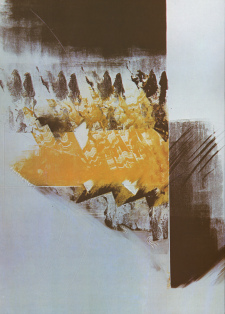
The Expulsion from Portugal 1496 |
29
Their Staffs in Their Hands:
The Expulsion from Portugal, 1496
In nights of darkness and obscurity, processions of
miserable refugees kept passing before us. They were given
a bed, a table, a chair, and a lamp, and they began to
tell us the story of the great and terrible expulsion of
the remainder of our Spanish brethren who fell from bad to
worse and were driven from Portugal.
Our Rabbi Shimon died then in the
Sanctification of the Mane. Everyone who did not leave by
the end of the first year was forced to convert. Twenty
thousand of the people of Israel were imprisoned in Lisbon
and baptized by force.
We and our children escaped by the skin of our teeth, and
we ate grass. And because of the bitter could that autumn,
because we had no clothing for the freezing weather and no
houses in which to dwell, we dug holes in the garbage and
lowered our bodies into them. And this is only a tiny
fragment of the suffering, the hardships along the way, of
a world that had gone mad:
"Our father, is this our reward?
Who is the Father who raised His sons to take His
vengeance on them?
Whose is the blazing wrath and rage that now is poured
upon them?
We sit on this earth and weep."
|
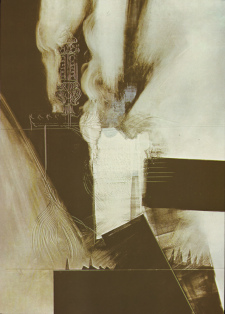
Burning the Talmud in Italy, 1553-1559 |
30
Our Talmud Was Burned:
Burning the Talmud in Italy, 1553-1559
[When you read Talmud it's clear that it is a book which
condemns and demonized other religions. So at least a
Talmud revision according to human rights should be
done...].
It seems there never was such weeping by people mourning
the loss of their dear ones, as by Jews lamenting the
death of their Book.
On Sunday of the New Year, 1553, Pope Julius
III decreed that the Talmud should be outlawed and
burned. When the agents of the Inquisition reached Rome,
Venice and Cremona, they did not discriminate between the
Talmud and other books. Every Hebrew book was removed from
Jewish homes and thrown onto the fire in the Campo dei
Fiori in Rome -
Go - wearing sackcloth.
Cry - for the light of the Torah and its crown.
Throughout our exile the decrees were harsh. We were used
to humiliations, expulsion and death. But in the face of
the auto-da-fe of books, a whole nation
felt that those who besieged it wanted to take away its
soul!
And as we mourned, we said:
"Behold, it is better to be killed by the sword than to be
desolate without the Torah."
31
The Lights Have Gone Out:
16th Century Passion Plays that caused the pogroms
|
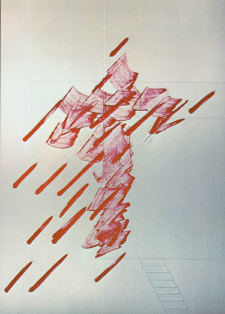
16th Century Passion Plays that caused the pogroms
|
He who has a heart should listen and
watch closely: with musical instruments and choirs of
shadows the hatred of Israel swells on the stage -
In Rome and other cities in Italy, Switzerland and
Germany, religious plays about "Jesus" and his Crucifixion
are performed.
Year after year the stage is set in the cathedral square
or before the stairs of the church. The canopies are lit
by a river of fireworks and torches, and the streets of
the Jews go dark.
Some of the plays describe the life of Jesus; others, his
wounds. In a choir of shadows they go on singing day and
night until the words are no longer heard, only the sharp
sound of hatred.
And when the lips of a man with nothing to say still
stammer -
"His blood!
His blood!"
- then the mob cries out:
"On them and their sons!"
And it pierces the homes of Jews like a knife.
32
To the Ends of the Earth:
A Page from the Notebook of the Marranos - The Burning
of the Marranos, 16th and 17th centuries [up to
Central and South "America"]
|
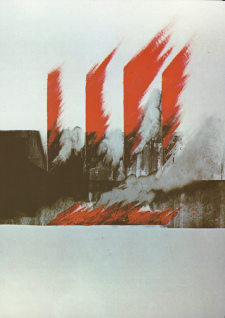
The Burning of the Marranos, 16th and 17th
centuries |
Gracia da Orta,
a famous scientist in the Portuguese colony of Goa, died
in 1568. Twelve years after his death his body was removed
from its grave and brought to "trial" by the Inquisition,
charged with observing the Jewish commandments in secret.
His corpse was burned and his ashes thrown into the ocean.
Francisca Nunez,
sister of Admiral Carvajal, escaped from
Spain. She was caught in Mexico, and was set on fire with
her four children in 1596.
Francisco de Silva,
a doctor, returned to Judaism secretly. He was caught and
burned in Lima, Peru, 1639.
Antonio Homem,
grandson of the Spanish Marrano doctor Moses
Bueno of Oporto, was burned in Coimbra, 1624.
Isaac de Castro
was caught in Recife, Brazil, and was turned over to the
Inquisition in Portugal. He was burned in Lisbon in 1647.
April 11, 1649, the citizens of Mexico City heard the last
cry of 109 Marranos from the fire:
"Hear Oh Israel, The Lord Our God, the Lord Is One!"
33
On the Edge of Annihilation:
Massacres of Jews by the Cossacks, Poles, Russians and
Swedes, 1648-1666
|
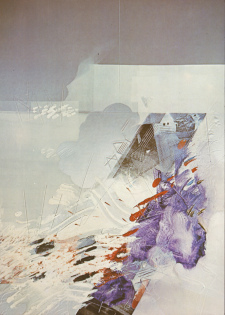
Massacres of Jews by the Cossacks, Poles, Russians
and Swedes, 1648-1666 |
Every night seas of flame raged upon the
houses of Israel in the bloody wake of the Cossacks. After
the tyrant Chmielnicki, may he be cursed,
stormed the city of Nemirov, another tyrant, Krivonos,
advanced on the community of Tulchin, at the head of
10,000 men.
The Poles made a pact with the Jews to stand together.
And two thousand Jews entrenched themselves in the
fortress of Tulchin to fight the Cossacks, but the Polish
nobles betrayed their allies and broke their pledge. The
Jews were left alone and went on fighting until their
strength gave out.
And in the city of Uman Jews fought for their lives alone.
They stood against the enemy until morning when they were
put to death cruelly. The Cossacks stripped off their skin
and threw their severed limbs to the dogs. Children were
killed at their mothers' breasts, or roasted alive on
spits over the fire.
And this was only the beginning of the great
conflagration. We were on the edge of annihilation.
All the sons of my people are stabbed
the cities are full of their blood.
34
Of Children Who Were Captured:
The Decree of the Cantonists in Russia, 1827-1854
Michael, the father of your grandfather, was celebrating
his tenth birthday when he was kidnapped from the arms of
his parents and sentenced to twenty-five years of service
in the Russian Army. It was the third day of Chanukah in
the year
|
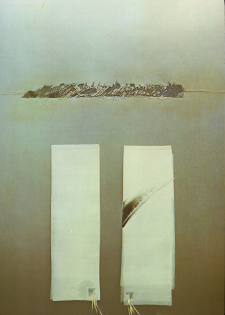
The Decree of the Cantonists in Russia, 1827-1854
|
when tens of thousands of Jewish
children were taken from their homes and transported in
convoys. Michael was put in a convoy of 3,900 children,
some of them two years younger than he. They were led on
foot for hundreds of miles until they reached their place
of exile in Siberia.
They marched the children ten hours a day, and the
soldiers accompanying them beat them with whips. One-third
of them died on the way; many were taken to hospitals
unconscious. In makeshift camps along the way, the
children were ordered to kneel for hours in the mud, and
the officer commanded:
"Those who want to convert to Christianity - step
forward!"
And they covered their heads with sacks and threw them
down from a high tower, while the officer at the bottom
declared:
"Those who want to convert to Christianity - step
forward!"
And they baptized them in the river, and the officer in
front of the laughing mob screamed:
"Those whose Jewish souls are still with them - will sleep
with pigs in their pen!"
[As Talmud condemns all other religions as "pigs", Jews
are condemned as "pigs" here].
When Michael reached Kazan and was put into the barracks,
he was ten years and five months old. The soldiers
discovered the four-fringed garment (arba-hacanfot)
on his body, they set fire to the fringes, and burned the
child's eyelids with them.
And he refused to taste pork all the years of his slavery.
The father of your grandfather, my son, fell as a hero in
defense of Sevastopol, in a war not his, and was not
buried in a Jewish grave.
[For Jews it's forbidden to eat pork. This is written in
the Mose books as an alienation from other former
religions where pork was a holy animal].
|
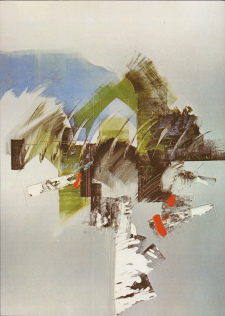
Blood Libel in Damascus, 1840 |
35
I Have Nothing but My Own Blood:
Blood Libel In Damascus, 1840
The blood libels that spread throughout the Christian
countries of Europe did not take root in the East until
the middle of the nineteenth century. There were many
decent people who believed this abomination was alien to
the spirit of Islam. And when the Pasha of Damascus raised
his hand against the Rabbi and threatened to cut off his
tongue at once, unless he revealed the names of Jews who
had murdered a Christian and used his blood for the
Passover matzot, our Rabbi Jacob Antibi
was stunned and tried to respond with honest words:
"It's a lie. I have nothing but my own blood!"
Our Rabbi could not imagine the magnitude of the
threatening catastrophe. On the holy Sabbath Jews were
compelled to open the graves in the cemetery.
Their houses were broken into. Heads were smashed. Elders
of the community were dragged off to prison. The
fingernails of the tortured were torn out. The limbs of
seventy men who were interrogated were crushed, and those
who did not die were forced to give false testimony. He is
the hero of the Damascus Affair.
|
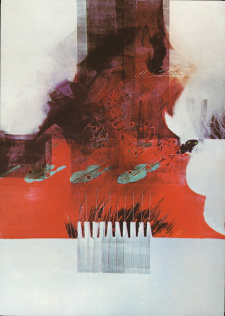
Trials in Yemen, 19th and 20th centuries |
36
Feet To One Side:
Trials in Yemen, 19th and 20th centuries
[In Muslim world the law was very different from time to
time, mostly tolerant, but some sultans were very
intolerant, to the point of destructioning of churches and
synagogues and pogroms].
"Jews are not permitted ... to ride astride animals, but
must keep their feet to one side."
Suffering and humiliation were the lot of the Jews of
Yemen during their exile. The rulers were cruel, issuing
decrees of conversion and destroying synagogues.
In the year 1818 there were pogroms in the city of San'a.
And heroic young men rose up among us and fought back. Ten
of them, may their memories be blessed, were caught and
beheaded in the square. And evil men made shoes out of the
Torah Scroll.
The decrees concerning orphans are memorable for their
terror. In 1928 an old law was revived permitting Moslems
to take every Jewish child, son or daughter, orphaned from
its parents, and to convert them to the religion of
Mohammed. And anyone who hid an orphan was liable to
forfeit his life.
The cries of the tortured rose from the gallows square:
"Hear O Israel, Oh Lord our God, here we are for the
massacre!"
|
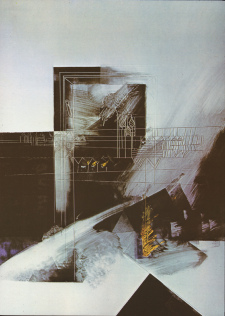
Pogroms in South Russia, 1881-1883
|
37
Storms in the South:
Pogrom in South Russia, 1881-1883
[A state's crises is the reason to blame the Jews and to
rob and to kill them in order to reform Russia t a modern
state. And church is cooperating...]
And behold a great dark terror. From one end of Russia to
the other, a wave of pogroms. Huge mobs attacked our
houses with overwhelming fury.
They got drunk before nightfall. Priests blessed them as
they set out.
The slogan - "Beat the Jews and Save Russia!" - was
provided by the intelligentsia, and police gave them
immunity.
They were ready -
And we waited for them every night:
15. April Yelizavetgrad
20. April Kishinev
27. April Kiev
1. May Minsk
2. May Balta
3. May Odessa
... Worse than anything was the waiting for the pogrom.
At four in the morning while I was still in my bed, I
heard my grandmother's voice:
"Nahum! Where can we take the orphans? They are coming to
slaughter us all!"
My little sister and I were orphans. Uncle Nahum said:
"We won't hide in the shed!"
Uncle Nahum was an enormous man, famous for his courage.
He went out in the yard and attempted to fight for his
life. The lawless mob immediately finished him with iron
bars.
|
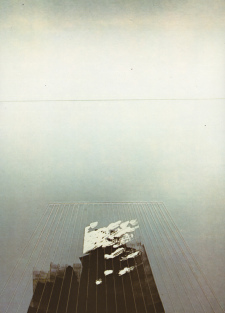
Pogroms in Kishinev, 1903 |
38
On The Slaughter:
Pogroms in Kishinev, 1903
"Sky! Beg mercy for me!
If there's a God in you, a way to Him
I have not found -
Pray for me!
My heart is dead, no prayer is on my lips,
I'm helpless, and there's no more hope -
Till when ... how long ... will when?"
|
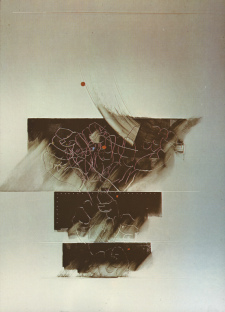
Self-Defense During the pogroms 1905
|
39
Blowing of the Shofar:
Self-Defense During the Pogroms, 1905
[Russia had the peasant's revolution in 1905, and with
every revolution one more act against Jews was done].
The bundles were lying in front of us on the ground
because in times of fire we were always ready. Once again
there was great fear and Jewish homes in Russia shook in
the wind. All their suffering in their faces, parents
looked at their children.
Questions gnawed at every heart: Where could we escape to?
Where could we take the children? When would it start?
Secret commands summoned crowds from the outskirts of the
city and the surrounding villages. The mob was armed with
iron chains, hooks, axes and rifles; soldiers and officers
rode at their head. Our older brothers met together in a
hideout, and a rumour gave them some hope: the regiments
of Bar Kokhba would fight for us in time of need.
That night I was at Heder with the other boys, and the
Rabbi was teaching us the Chapter starting, "And these are
the generations ..."
Excited by what I'd seen that day I was deep in thought,
and when my turn came to read my portion, these words came
from my mouth unintentionally: The voice is Esau's voice,
but the hands are the hands of Jacob ... At once I lowered
my eyes, afraid that the Rabbi would slap my face because
of the mistake. But the Rabbi was silent for a long time.
Suddenly his eyes glowed.
"My son," he said, "the words of a child belong to our
Father in heaven, may they be fulfilled!"
At that moment there were shots outside, and at the same
time we heard the broken sounds of the shofar,
and this time it was the signal for self-defense, calling
the Jews to fight for their lives.
|
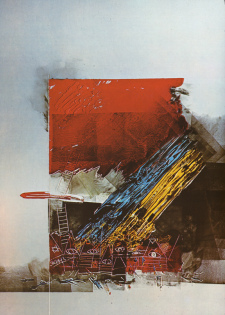
Petlyura Pogroms, 1919
|
40
Out of the Depths:
Petlyura Pogroms, 1919 [pogroms in Ukraine]
[Russia was governed by a Jewish clique under Lenin and
Stalin, and because the colonial powers were not able to
give way for a foundation of Israel, Jewish organizations
were founded with a heavy answer by the Europeans with
pogroms and discrimination. In Ukraine many pogroms were
organized when Poland had conquered Kiev for some months
and the Russian troops won back to the Vistula River
before Warsaw].
Sarah Fuchs was
a revolutionary in Russia, one of the bravest fighters in
the ranks of the Socialist party, the "Bund". In 1919 she
was nominated as the representative of the Committee on
Aid for the people injured in the pogroms in Kiev.
In this capacity she crossed the length
and breadth of the Ukraine and saw how the Jewish
villages were plundered. Suddenly flags fell, veils fell,
and Russia looked at her with monstrous eyes. After she
took detailed testimonies from the survivors of the
massacre, she presented the report to the Central
Committee.
"Comrades," Sarah tried to say, "I've seen the truth."
But the Comrades didn't understand.
Sarah Fuchs was twenty-eight. On that same day she drowned
herself in the Dnieper River.
Her memory will be preserved with all our brothers and
sisters who, in their death, commanded us to live.
|
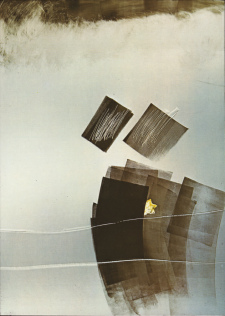
Minsk Ghetto, 1941 |
41
Father, Father:
Minsk Ghetto 1941
[You have to know: Communism had been financed by the
financiers of the "USA", and also the Third Reich. The
plan of the Anglo-Saxon Free Masons with their centre in
Scotland to get Europe destroyed and to have the "USA" as
a leading power of the world was well completed. And
Jewish refugees in the "USA" were working for them...].
It's five in the morning. People are being pushed out of
all the yards. Driven by the shouts of the Germans, and
their rifle butts, we go in confusion down to the street
teeming with men, women, and children. Everyone tries to
squeeze into the center of the crowd in order to get away
from the police. The grown-ups carry large bundles,
wrapped in bed sheets, on their shoulders. I am not
crying, only holding tightly on to my father's hand. His
hand is wet, and I hang on to him without making a sound.
We march.
I can't see where because in front of me there are people
with bundles on top of them. When I peek through the flap
of my fahter's coat and see how tall and big he is, I'm
not so scared, and I try to keep up with him, staying very
close to his side. Suddenly there's a terrifying voice
from the front of the line, in German, and the mass of
people is split in two. My father's hands is wrenched from
mine. Father!
Where is father?
|
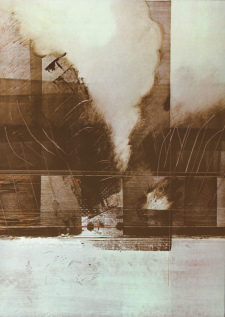
Zaglembia, 1942
|
42
A Flake of Snow:
Zaglembia, 1942
[A train to the East had many different destinations, and
Auschwitz was only one of them. Other destinations were
the concentration camps in the Baltic States or in the
augmented Romania or in the Ukraine. Some trains were
several weeks on the way because deportation trains had
the last priority].
We were moving swiftly [and we] past railroad stations and
bridges, and ever since the morning it was clear to all of
us that we were being taken to Auschwitz. But the people
in the boxcars thought of only one thing - water, a little
water. The death rattle of dying men was heard all around;
people fainted but were left standing because there was no
room to fall.
I was twelve years old, and my little brother next to me
was sweating all over. With all my strength I shoved
myself up toward the barred hatch, dragging him with me.
"Don't put your hand out, it's dangerous, child!" they
warned me. But I tried again to grab a handful of snow
from outside. I'll never forget the moment when I finally
managed to scoop up some flakes!
I carried the snow in my cupped hands like a small wounded
bird, and wanted to offer it to the lips of my brother.
Other children stuck out their tongues, begging to lick
the snow, but I gritted my teeth and pushed them away. And
then I saw a woman feinting, with a baby at her breast. I
gave her the last flake of snow, and my brother said:
"I'm not thirsty at all."
I kissed him, and we both burst into bitter tears. There
was a long whistle. The train came into Auschwitz [and
mostly the transported had been transported to further
regions till Romania or the Baltic States].
[1943-1945 the Jews had been partly transported back from
Eastern Europe into the Reich. Most of the Jews were
employed in bunker constructioning with 10,000s of
deaths].
|
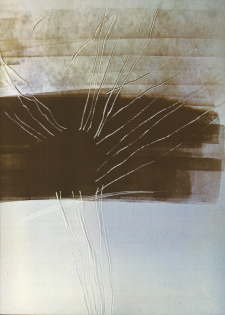
Kovno, 1943 |
43
The Chosen People:
Kovno, 1943
The rounding-up of the children went on from Tuesday to
Saturday. Mothers tried to protect their babies. They were
beaten until they bled, and the children were taken away.
The children were thrown on to freight cars. A mother,
whose three children were brutally torn from her arms,
screamed out, beside herself. She did not weep; it was a
great howl that pierced the wind from one end of the
platform to the other. Silencing all other voices by its
terror, it was like the cry of a wounded animal. Even the
Germans were shocked, and the officer told her:
"Climb quickly into the wagon and take out your child - "
Our breath stopped for a moment, and the officer added:
"But you have to choose one, do you hear, Jew, only one!"
When the mother climbed up to the freight car, the
children stretched out their arms and held her. The three
of them cried, "Mother, save us, mother!"
The mother froze. Everything blurred, and she was taken
out of the car with empty hands.
|
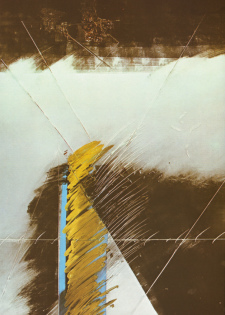
Vilna Ghetto, January 1, 1942
|
44
Proclamation:
Vilna Ghetto, January 1, 1942
Jews, we won't go like sheep to the slaughter!
Jewish youth, don't trust those who fool you.
Out of 80,000 Jews in the Jerusalem of Lithuania, only
20,000 remain ...
Whoever is taken through the gate of the ghetto will not
come back again. All the ways of the Gestapo lead to
Ponary. And Ponary is death. Hitler is plotting to wipe
out all the Jews in Europe. It is the fate of Lithuanian
Jews to be the first in line.
Let us not go like sheep to the slaughter! Indeed we are
weak and without weapons, but the only answer to the
murderer is Self-defense!
Brothers! It is better to die as free fighters than to
live by the grace of murderers. We will defend ourselves!
We will defend ourselves to the last breath!
|
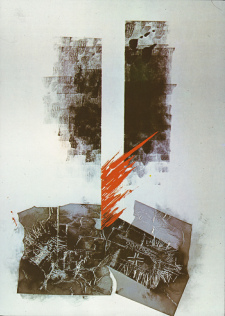
Warsaw, April 19, 1943
|
45
The Revolt of the Doves:
Warsaw, April 19, 1943
[Doves fly away when danger is coming - but the Jews could
not go anywhere. The comparison that Jews should be doves
is doubtful when you read the damnations in the "holy
scriptures" of the Jews].
On the eve of Passover the Warsaw ghetto was surrounded.
From the lookout I watched the army advancing in columns
beside the wall. I saw masses of gleaming helmets in the
morning sun, and my heart seemed to stop. I pulled the pin
of the grenade and threw it out of the window. From that
moment every house in the Warsaw ghetto became a battle
position.
From the windows, on every floor, fire was poured on the
Germans and the Ukrainians. Deborah stood in the window
above me. A soldier noticed her and shouted to his friend
as if shocked:
"Look, Hans, a Jewish woman with a gun!"
They aimed their rifles at her, but Deborah was quicker.
She threw a grenade at them, the only one she had.
|
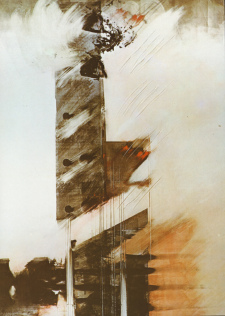
Warsaw, April 23, 1943 |
46
The Ghetto Burns:
Warsaw, April 23, 1943
Every night seas of flame raged and tongues of fire
circled above the Warsaw ghetto. House after house
collapsed, and the sky took on a frightening light. And
nearby, beyond the wall, life continued as usual.
The citizens of the Polish capital went for strolls,
amused themselves, and saw the smoke thick by day and a
pillar of fire by night. There were some who dared to come
close to the ghetto wall to get a better look at "how the
Jews burn."
And when the wind carried the flames and set fire to a
house on the other side of the wall, firemen rushed there
at once. Only our fire has no one to put it out.
|
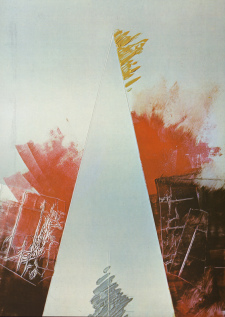
Mila 18, Warsaw, April 25, 1943
|
47
The Commander's Farewell:
Mila 18, Warsaw, April 25, 1943
... I don't know what to tell you. Something has happened
that is beyond our most daring dream: the Germans have
been driven out of the Ghetto twice.
... For three days the Ghetto has been trapped in flames.
Tonight we are changing to guerrilla warfare.
... I can't describe our present conditions. Only a few
will survive; everyone else will perish sooner or later.
Our fate is sealed. In all the bunkers you can't light a
candle for lack of air.
... Goodbye, dear friend, the last wish of my life has
been fulfilled. I have been privileged to see Jewish
defense in the Ghetto in all its greatness and glory.
Mordechai Anielewicz
[This "greatness and glory" is related to the damnations
in the "holy scriptures" against all other religions, so
the "greatness and glory" seem not to be so "great" and
"glorious"...]
|
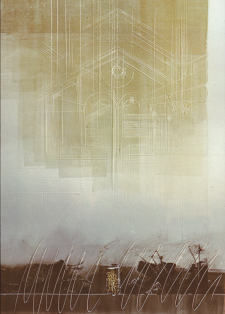
Cracow, 1944
|
48
Alone With Everyone:
Cracow, 1944
She stood in a familiar street, the end of her black braid
between her fingers, and one arm clutching her doll. Her
eyes went back and forth over the closed windows, and a
stranger told her:
-- "There is nothing to look for, child." - "I'm looking
for my city, Cracow."
-- "This is the city. Where do you want to go?" - "To our
synagogue, the synagogue of the REMA."
-- "Who are you looking for in your synagogue?" - "My
father, the cantor."
And he said to her:
-- "These houses, my child, are empty."
"So I'm alone," said the child, "I'm late. My brothers
were all taken in the sealed cars."
|
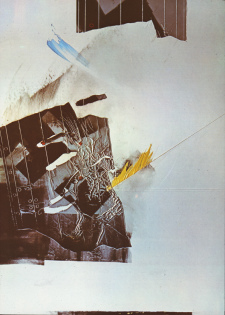
The Forests of the Partisans, 1944
|
49
The Sound and the Fury:
The Forests of the Partisans, 1944
The winter of 1944 was nearing its end. The paths in the
forest were thawing by day, and at night the earth was
frozen again like sharp glass.
The Partisans who reached the entrance of the village
under cover of darkness split into two groups, the Russian
company taking up positions in the west and south, while
the Jewish company dug in on the bank of the frozen river.
There were seven minutes to go before the awaited signal.
The loud voices of the German soldiers slowly became
silent behind the houses. Baruch and Uri had grown up
among those wooden houses. They had played and dreamed in
the alleys. In the woods near the old cemetery where they
first experienced love, their families had been brought to
be massacred.
A red flare was fired, and Zaytzev's group screamed all at
once:
Forward comrades, for the sake of your homeland!
At the same moment, the voice of Baruch was heard loud and
clear in Yiddish:
"For the sake of spilled blood, comrades, for our
brothers!"
Uri released the pin and jumped to his feet. Words ceased.
And he heard nothing else but the fire in front of him and
the ice shattering under his feet.
|
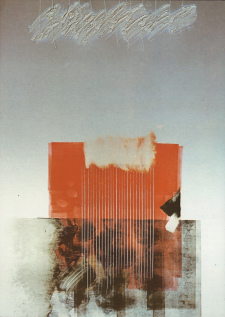
Europe 1945
|
50
The Candle of Anonymity:
Europe, 1945
On that day the remnant came out: two from a city, one
from a village. A woman and her child came out of a bunker
under the ruins. A man came out of a sewer. Survivors came
out of the forests of the Partisans. The rescued came out
of Auschwitz. In Europe the sun was shining - and the
world was back on its course. They stood among heaps of
ashes, a flaming stone in their hearts:
City.
City.
How mourn a city
Whose people are dead and whose dead are alive in the
heart?
[One big part of the Jewish population had been killed in
ghettos and camps by illnesses, another part had been
forced to work to death in bunker constructioning, and
another part had been deported by Stalin to Siberia with a
high death toll, and another part had been killed by
people smugglers, and another part had succeeded to
survive or to flee. And Vatican had always a special
agreement with Hitler, and this catholic Hitler is not
excommunicated post hum until now...].
|
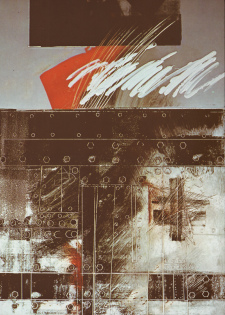
The suffering is going on..
|
51
The Scroll of Suffering That is Not Over
For the prisoners of Zion who have been continuously
persecuted in the Soviet Union.
For Hebrew writers murdered
in concentration camps in Siberia because of the sin of
their loyalty to the language of their fathers.
For teachers and their students guarding the culture of
Israel, who were carried off to interrogations and
torture.
For Jewish physicians, victims of a monstrous libel.
For the leading writers in the Yiddish language, beheaded
in cold blood in Stalinist Russia while the ashes in the
ovens of Auschwitz were still warm.
Their memory will be preserved in the Scrolls of Fire of
the nation that fights for its life.
[Russia headed a warm policy towards the Jews with the
hope a new Israel would be a Communist satellite. But when
Jewish policy stuck together with CIA Russia turned all
it's force against the Jews, also in inner Russia].
|
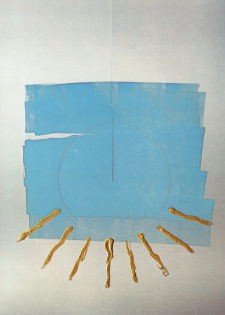
In memoriam
|
52
And Let Us Remember
The parachutists, emissaries from Israel, who were the
first to come to the aid of the nation besieged in Europe,
and who did not return.
And let us remember
the volunteers of the fighting Jewish Brigade,
the Jewish soldiers and officers in the armies of the
Allies who fell in the war against Nazi Germany.
And let us remember
the anonymous illegal immigrants and their leaders who
drowned in the sea with a vision of their homeland.
And let us remember
those who went to the gallows risking their lives for the
freedom of Israel.
And let us remember
the daring spirit of the fighters of the Resistance and
the soldiers of the Israeli Defence Forces on the
battlefields.
And let each one of us remember
all those who fell in the battles of redemption and in
their deaths commanded us to live.
[Fact is that Jews in the "USA" and in England were
confronted with a heavy discrimination until the 1960s,
not so at all in Germany since 1945. But this Anglo-Saxon
discrimination is never mentioned.
Racism in Herzl's book "The Jewish State" vom 1896 with
it's general judgment against Muslims as "barbarism" is
never mentioned, too. Between Judaism and Islam a
consequent peace work and a pacifistic revision of the
"holy scriptures" is missing].


